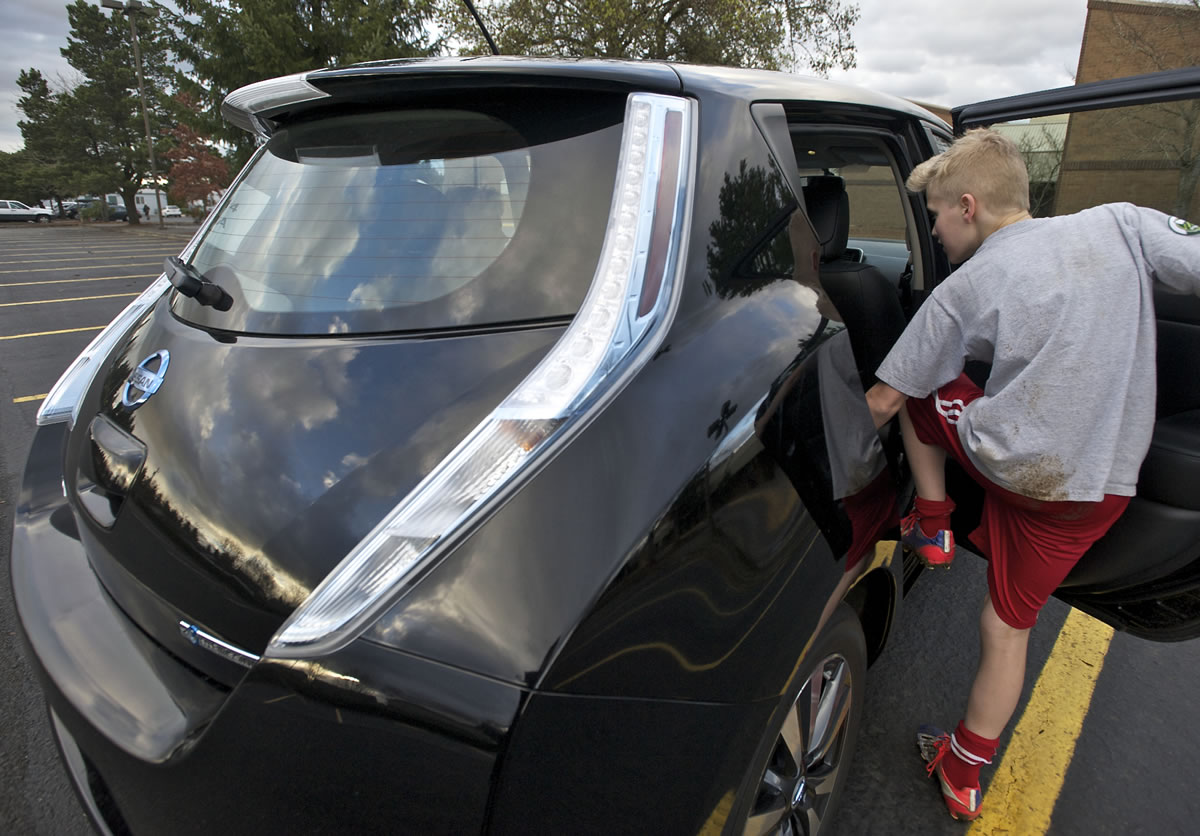In April 2013, when Washington state gas prices averaged more than $3.80 per gallon, Herman Briggs, a retired Postal Service worker, made the big switch to an electric car that liberated him from the gas pumps.
He abandoned his Chevy Malibu in favor of a two-year lease on a Nissan Leaf, a battery-powered vehicle capable of ranging up to 84 miles between charges.
Two years later, the average price for regular in Washington has dropped below $2.50 per gallon.
So Briggs is facing a decision once his lease expires this spring.
Should he stick with an electric car, or return to a gas engine and the convenience he confesses to missing of a quick fuel fill-up in a matter of minutes?
“I’m still going back and forth on it — and I’m not really sure what I will do,” Briggs said recently as he stopped by the Alan Webb Nissan dealership in Vancouver to charge up his Leaf.
Across Washington state and the rest of the nation, automotive shoppers will be weighing their options in 2015 — a pivotal year for a fledgling electric-car industry that is rolling out a record number of models amid a historic downturn in gas prices.
“Nearly every major automaker has an electric vehicle on the market or in the works,” said Christine Rogala, a spokeswoman for the Electric Drive Transportation Association.
In the past, interest in alternative-fuel vehicles has sagged in tandem with big declines in gas prices. This time around, electric-car proponents are hoping they have turned a corner, noting that overall U.S. plug-in sales climbed more than 22 percent from a year earlier, even as crude prices plummeted.
Yet the more than 118,000 plug-ins acquired in 2014 still represent less than 1 percent of the year’s more than 16.4 million total vehicle sales. And if gas prices stay down for a prolonged period, electric vehicles’ battle to claim more of the market is expected to be more challenging.
“The thing that all EVs have going for them is that consumers are more open now to newer technologies, so the hurdles to overcome are arguably lower,” said Jamie Albertine, an auto analyst with Stifel. “But at lower gas prices it’s going to be a little trickier.”
State a hot market
In 2014, as in recent past years, Washington has been one of the hottest U.S. markets for plug-ins, with motorists who seek a greener vehicle also benefiting from the nation’s lowest electricity prices. On average, Washington plug-in-drivers — even with lower gas prices — still pay about a third the amount paid by a motorist operating an equivalent gasoline vehicle, according to the federal Department of Energy.
State motorists considering an electric car also have an abundance of choices. A high-end Tesla Model S that sells for more than $70,000. Low-cost offerings include vehicle such as the Gem E2, a two-person vehicle that can be driven at speeds up to 35 miles an hour, sold by Seattle’s MC Electric Vehicles for less than $8,000.
Electric cars in Washington also have strong support from Gov. Jay Inslee.
In this state, most electricity is generated by hydropower that emits no carbon dioxide. That burnishes the green credentials of electric cars charged in Washington compared to states where most electricity is generated by fossil fuels. To help coax consumers, Inslee proposes extending a sales-tax exemption for electric vehicles, which is set to expire this summer.
To expand the use of electric cars, Inslee also proposes more fast-charging stations that enable some models to receive an 80 percent charge in less than 30 minutes, compared with hours at other stations. He hopes those will help boost the number of plug-ins on state roads from 10,000 vehicles today to 50,000 by 2020.
“I’ve made the advancement of electric vehicles a top priority,” Inslee said during a November speech in Seattle. “We are one of the national leaders in market share, and we ought to be proud of that.”
In Washington, as elsewhere in the country, the top-selling electric car is the Nissan Leaf, which accounted for nearly a third of all plug-in sales nationwide through the first 11 months of 2014.
“We thought with lower gas prices we would see a drop in the volume of sales with the Leaf, but we have not,” said David O’Brien, of Campbell Nelson Nissan in Edmonds.
For shoppers considering a Leaf, one of the biggest obstacles for driving the vehicle home is what sales staff call “range anxiety.” That’s the fear of running a battery down and being left without power.
To help ease such concerns, Nissan salesman Jake Wilson at the dealership in Vancouver takes shoppers to his computer and calls up a website, Plugshare.com, with a map pinpointing multitudes of plug-in locations that drivers can find using their smartphone.
Wilson also notes that the rapidly evolving technology for electric cars prompts the vast majority of his sales to come in the form of leases — rather than purchases of a vehicle that may soon become outdated.
Statewide, 64 percent of plug-in owners lease their vehicles rather than buy them, according to Tonia Buell of the state Department of Transportation.



